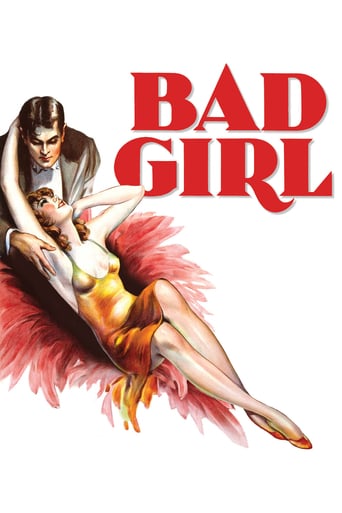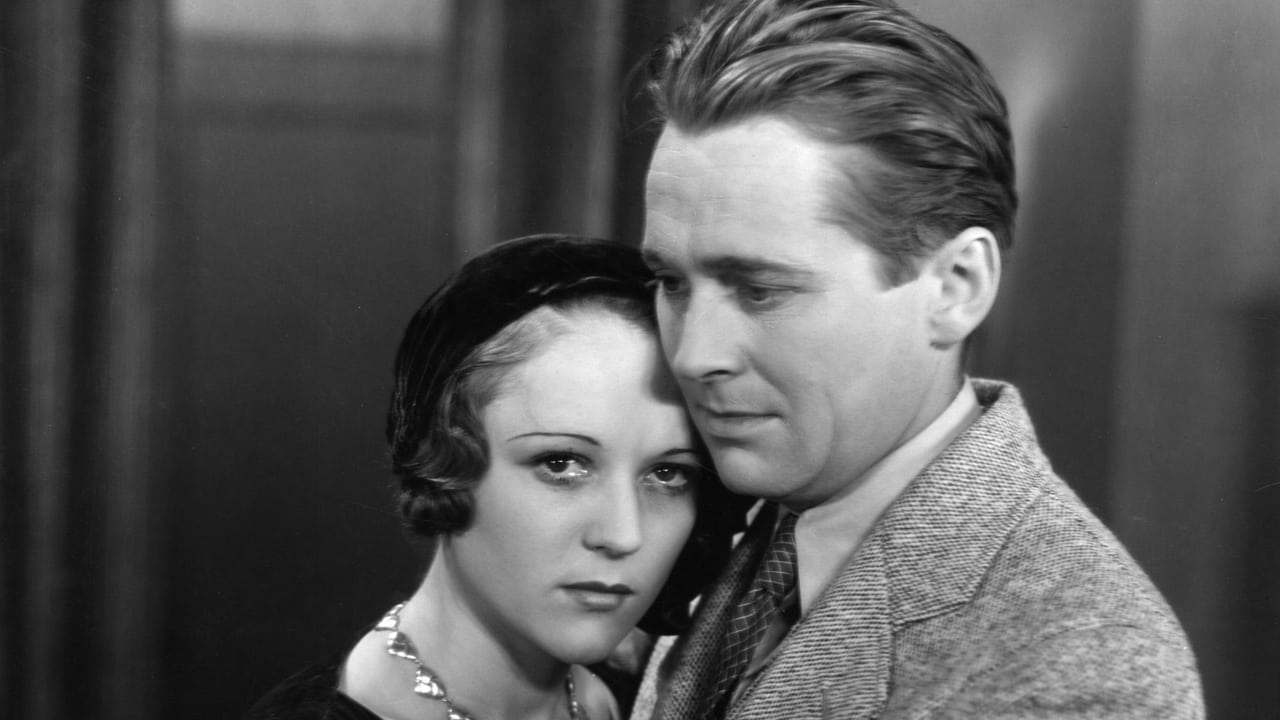bkoganbing
Bad Girl is another of Frank Borzage's romantic dramas of the trials and tribulations of lovers usually caught in circumstances and forces beyond their
control. In this case it's the Great Depression and their own attitudes about
romance itself.Their attitudes being that romance is just a lot of bunk. But attitude or not
James Dunn who was making his feature film debut and Sally Eilers are in love
in spite of themselves. I'm not quite sure why the film is entitled Bad Girl since there really isn't nothing bad about Eilers at all. Possibly her original attitude though that is
quickly corrected. These are just two people trying to get by, but they always
seem to misjudge attitudes because of first impressions and say the wrong
things at time.Take for instance the new apartment that Dunn uses all his savings in to impress Eilers. He says exactly the wrong thing about the two of them living
only for today. That's just at the time she was about to break the news that
wasn't to be two any more, but three.Dunn really loves her. How many husbands to earn an extra couple of dollars
would go out and try to go 4 rounds with a professional prizefighter? Charles
Sullivan proves to be a good guy however.So does Claude King as the obstetrics specialist who does Dunn a solid when
Dunn wants him for his wife's delivery. None but the best as Dunn beautifully
carries off a scene breaking down begging for King's services.The film adapted from a Broadway play of the previous year won an Oscar for
adapted screenplay. It also won for Frank Borzage an Oscar for Best Director.Today's audiences might get a kick out of the prices and the amounts needed for many things. Inflation has come a long way since. Still the themes are
universal and I think Bad Girl holds up well today.
JohnHowardReid
Producer: Frank Borzage. Copyright 18 July 1931 by Fox Film Corp. New York opening at the Roxy, 14 August 1931. 8,046 feet. 89 minutes.SYNOPSIS: A year in the lives of two young married people in New York's tenements. The movie has considerably changed both the plot and the title character of the stage play. "Bad Girl" is now a totally incorrect title. There is no "bad girl" in the picture.NOTES: Feature film debut of Broadway stage star, James Dunn. (He had previously appeared in five movie shorts).The Academy of Motion Picture Arts and Sciences selected Frank Borzage for Best Directing (defeating King Vidor's The Champ, and Josef von Sternberg's Shanghai Express), and Edwin Burke for Adapted Screenplay (defeating Sidney Howard's Arrowsmith, and Percy Heath and Samuel Hoffenstein's Dr Jekyll and Mr Hyde).Bad Girl was also nominated for Best Picture (defeated by Grand Hotel), and was placed 4th in The Film Daily poll of U.S. film critics (after Cimarron, Street Scene and Skippy). It was selected by The New York Times as one of the Ten Best Pictures of 1931. The stage play opened on Broadway at the Hudson on 2 October 1930 and ran a very moderately successful 85 performances. Sylvia Sidney played the title role, while Paul Kelly did the husband. Marion Gering directed.COMMENT: Frank Borzage was not only Hollywood's king of romance, but a superlative craftsman who could play on the strings of an audience's emotions like a master violinist. His own temperament echoed the image of a confirmed sentimentalist. A quiet man, Borzage (pronounced "Bore-zaig/ie", the "zaig" rhymes with "plague") never raised his voice on the set and never drew attention to himself. Untutored visitors always assumed he was a script clerk or continuity assistant.Yet any critic who writes a book on Romance in the Cinema will always place Borzage's name at the top of the list. He really believed in what he was doing. In fact, he persisted in his adoration for Romance even when it was out of fashion. In this instance, of course, the movie struck a timely chord with Depression audiences.Oddly, In the free-and-easy, pre-censorship Hollywood world of the early pre-code 1930s, Borzage and his very clever scriptwriters Edwin Burke and Rudolf Sieber cleaned up Delmar's play, changing characters and plot to an enormous extent, even though there was absolutely no pressure on them to do so. They succeeded in making Bad Girl far more romantic, if almost equally realistic. In fact, it's not the romance that seems artificial, but the occasional comic relief. In the stage play, the heroine, a little Bronx stenographer (Sylvia Sidney), is an unwed mother who is forced to marry a petty racketeer (Paul Kelly), whom she tries to reform.The film "version" bears only one vague relationship to the stage play, namely the fact that two young people get married and settle down in a New York apartment. Otherwise, it is completely different in every respect. Mordaunt Hall in his review in The New York Times even goes so far as to state that the "only adverse criticism" he could make of Bad Girl was "its strangely unsuitable title." He was being sarcastic, of course. He knew perfectly well how the title came about. He continues: "However, that is of small importance, for many a poor picture has boasted a good title."This must-see movie, is now available on a 10/10 Fox DVD set. In fact, I'd like to give this movie 10/10 also, but that deceptive title might annoy some people.
Rob-120
If there was ever a movie with a misleading title, this one is it. With the title, "Bad Girl," the fact that it's Pre-Code, and the movie poster showing a scantily-clad woman lounging in a chair with her arms raised, while a man leers suggestively over her shoulder – you think this movie is going to be about a woman of loose morals, like Jean Harlow or Marlene Dietrich.But it's not. Instead, it's a romantic melodrama that tells the story of a young married couple trying to make it through their first year of marriage during the Depression. Dorothy Haley (Sally Eiler) marries Eddie Collins (James Dunn), a tough talking "Noo Yawk" radio salesman, who is secretly a softie inside. In the movie's opening scenes, Dorothy is a streetwise dress model who easily parries the advances of men who make passes at her. But after she marries Eddie, she turns into an emotional girl with an overactive imagination. (When Eddie is late on their wedding day, Dorothy bursts into tears because she assumes he has deserted her.)Dorothy isn't really a "bad girl." She's just dumb as a box of rocks! Unfortunately, so is her husband. Eddie and Dorothy spend the movie trying to make each other happy, but they're both too stupid to realize they actually want the same things. This leads to an extended version of what Roger Ebert called the "Idiot Plot," where there are lame misunderstandings and the characters keep secrets from each other for no reason except that the plot requires it. If they would just tell each other those secrets, it would solve all their problems, but it would spoil the plot. It's called an "Idiot Plot" because the characters have to be idiots for it to work.Case in point. Soon after their marriage, Dorothy finds out she is pregnant. But Eddie has saved up $650 to open his own radio store. Not wanting him to spend his savings on her, Dorothy doesn't tell Eddie about the baby. Instead, she tells him she'd like to go back to work, to earn more money. From this, Eddie concludes she is unhappy living in their one-bedroom apartment. So he spends his $650 to buy them a big house and furniture, which Dorothy likes but didn't really want. Only then does she tell him she's pregnant.Now, this could have been handled as a variation on "The Gift of the Magi." But in the "Magi" story, the husband and wife actually learned something from their experience. Eddie and Dorothy learn nothing, and keep making the same dumb mistakes.Eddie and Dorothy each wrongly assume the other one doesn't want the baby, which results in more problems with their marriage. When Dorothy decides she needs an expensive doctor, Eddie tries to earn the money as a boxer. When he comes home with bandages on his face, Dorothy accuses him of going to a speakeasy and getting in a fight, instead of staying home with her. For some reason, Eddie doesn't tell her about the money he's won, or that he got her the doctor she wanted.(On a side note, the movie's one great scene is when Eddie steps into the ring with the Champ. He gets beaten up pretty bad and is about to go down when he whispers to the Champ that he needs the money because his wife is having a baby. The Champ says, "Well, why didn't ya say so? I got kids of my own!" He then literally carries Eddie around the ring for a few more rounds, all the time talking about his own kids.)If this story had been handled comically, it might have been a forerunner of "The Honeymooners" and "The Flintstones." (There were times when Eddie reminded me of Ralph Kramden.) Instead, we get a sappy romantic melodrama that is instantly forgettable.It's surprising that Frank Borzage won an Oscar for directing this claptrap, and that the lame screenplay won an Oscar as well. Borzage made better films than this (see "Seventh Heaven" and "Street Angel"), and there were better directed films released in 1931-32 (such as Charlie Chaplin's "City Lights," James Whale's "Frankenstein," William Wellman's "The Public Enemy," and Edmund Goulding's "Grand Hotel"). But AMPAS was young then, and young organizations are bound to make mistakes.
marc
I finally tracked down Bad Girl. It had been on my list of wanna sees for years as it had won a major Oscar for Best Director- Frank Borzage.It was one of those tantalizing early talkies that had not actually been lost it had merely fell from sight. When I finally saw it last year at a Borzage revival, the film was a revelation.It was a pre-code delight about an ordinary couple, falling in love, struggling financially and having a baby etc.It most reminded me of the great silent film-The Crowd, which dealt with similar matters. What was especially fascinating to me was its depiction of "average" lower middle class types and how they lived and spoke in Depression America. The apartments... the slang, all of it, seemed real. It wouldn't be until the 50's neo realism hit American movies that we would see ordinary people depicted on the screen again, without condescension The movie has all the Borzage trademarks- love surviving against all odds, even an exciting if a little hokey climax.Unfortunately, the film has been slighted often in movie books,most likely, because the authors have never actually seen it. If it is ever shown again, try to see it. It's a wonderful peek at average city folks in Depression America.



 AD
AD


